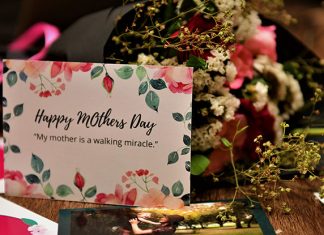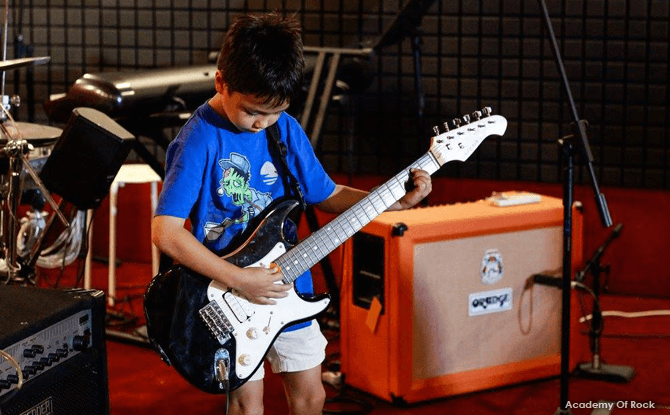

So you’re thinking of sending your child for music lessons. Easy! What instrument? Piano or keyboard? Maybe drums.. or, hey, guitar? Wait, it’s not as straightforward as we thought.
In our earlier Ask The Experts (ATE), we dealt with the issue of whether piano is a good instrument to start with for music lessons.
In this ATE, we ask our panel of experts about comparing contemporary music lessons to classical music lessons. Can the child start with contemporary music instead of classical? Is there more creative freedom in contemporary music? What are the things to look out for in a teacher?
Little Day Out’s ATE series explores the top questions parents have of courses and lessons – as well as potential landmines to avoid.
OUR PANEL
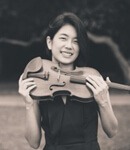

Artistic Director, The Music Circle, violinist & violin educator
For more than 10 years, Tee Tong has been working with students from ages four to adults, both in Singapore and in US, where she is currently pursuing a Doctorate of Musical Arts (DMA). She underwent Suzuki teacher training with Mr William Starr, founder and 1st President of Suzuki Association of the Americas. As an avid performer she has also been actively collaborating with fellow musicians on unique projects at festivals and venues around the world. As the Artistic Director of The Music Circle, Tee Tong and her team craft long-term programmes to pique the curiosity of our young minds towards music. She also holds a Masters of Music in Violin Performance.


Director, Juls Music Agency
Julian graduated from the Yong Siew Toh Conservatory of Music, NUS, with a Bachelor of Music in Tuba Performance and is currently a Masters of Education (Music) student from the National Institute of Education (NIE-NTU). Having performed with established groups in Singapore such as the Singapore Symphony and the Singapore Lyric Opera, Julian specialises in secondary school band education and is a conductor of several school bands around Singapore. He is also the founder and director of Juls Music Agency.


Music teacher, Academy of Rock & performer
Ahmad started teaching under the Ministry Of Education music programme. He teaches mainly guitars, bass and occasionally, drums. His teaching job takes him to primary and secondary schools during curriculum hours to teach a variety of music programmes such as guitars, percussion and audio recording. During his freelancing days, he also taught private tuition at students’ homes and work in a various of music centres. He has also worked with kids with autism and ADHD. Ahmad holds a Rockschool Grade 8 in Guitar.
LDO: Is it alright for a child to start off with learning contemporary music? Or is it necessary to have classical music as a foundation?
TT: It doesn’t really matter how a child starts off learning music. The tools and technique required for instrumental playing is essentially the same and if the child’s interest is more geared towards contemporary music, that interest would make a great entry point for the child to pick up an instrument.
Using a student’s interest as much as possible in their learning would enable them to be engaged in creating their own musical journey from a young age. If a teacher is flexible, technique can be taught with any piece of music, whether contemporary or classical.
JL: It really depends on the ultimate objective of the parents and the child. Contemporary music is what we are used to listening every day, from rock to R&B, Pop or even metal.
The common perception is that contemporary music teaches “bad stuff”. But there are many good songs out there that teach good values through music and lyrics.
Classical music teaches the more traditional concepts such as music theory and harmony, correct playing techniques and so on. Pop artistes such as Lady Gaga and Jay Chou started with classical music too! It is not necessarily bad to start off with contemporary music.
AK: Contemporary music is easier to digest, easier to learn and most importantly, it’s a quick route to start strumming to a few songs. In a world where music is dominated by genres such as rock, hip hop, pop and dance, kids are exposed to such music from an early age.
Contemporary music is a good start in entering the world of music. Classical music takes you to another level of music development. In my opinion, having a bit of both worlds will make you a better musician.
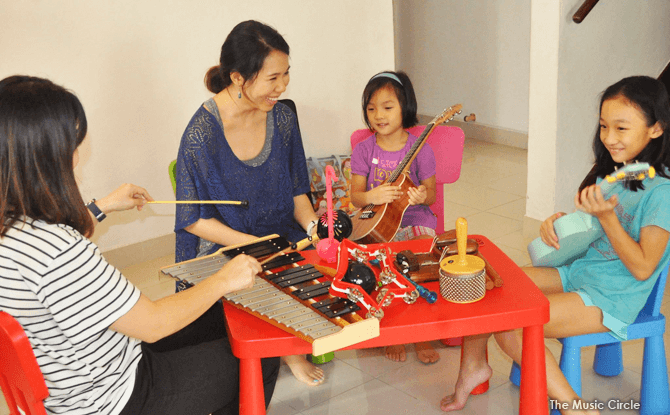

Kids have fun learning a range of instruments at The Music Circle’s Grow With Music! Camp.
LDO: Does contemporary music provide more freedom for a child to explore creatively, compared to classical music?
TT: On the surface, it does seem that contemporary music provides more freedom since there are more opportunities for improvisation involved. In the classical music realm, due to the stress of ABRSM exams as well as the rigidness of playing music that has been set in stone and passed down for generations, the freedom of creativity can sometimes be lost.
However, through both classical music and contemporary music, a child may be guided to explore his/her instruments as well as music creatively. Any kind of music education and exposure can definitely be used as a stepping stone for a child’s creativity to run wild!
Music itself is born from a creative process regardless of tradition, and even during the learning stage of an instrument, the right environment can spur kids to explore creatively!
JL: First, we have to define what creativity is. If it means to create, we have to have a framework for a young child to create. Contemporary songs today revolves around a basic four-chord structure. By having some music theory, a child can compose a song easily.
But in order to create more complex music, I would say the classical route is what a student needs. With more tools, we can do more things, don’t we? Do note that this doesn’t apply to Jazz as it requires a lot more training in aural and theory for that to happen.
AK: Music allows creative freedom and expression. The more proficient the child becomes on an instrument, the better he or she will be able to play what they want and how they want.
To a certain degree, contemporary music provides more freedom for a child to explore creatively. Improvisation is required in certain songs where there is a section with an instrument solo part.
Classical music involves minimal improvisation and is more rigid. The players have to play every note according to the score.
LDO: What’s the difference between contemporary music lessons and classical music lessons? Eg. Instruments, theory, methods, discipline. I’m not sure which to choose for my child.
TT: Each music lesson is different. Even within the classical music realm itself, there are many methods that are being used. Every music teacher draws on their varied experiences and education so their approach to music education would be very different as well.
If you are unsure of which to choose for your child you should definitely bring your kids for some trial lessons. Attending concerts or musical activities that involve children also helps. With those experiences, you can evaluate your child’s interests better.
Finding a suitable teacher that fits your child is also crucial as this will affect your child’s receptiveness to learning music.
JL: Personally, learning contemporary music is learning a simpler form of music. You do not need to go through higher grades of music theory to compose songs, but you will definitely need the knowledge of more complex music theory to compose, say, a piano sonata.
In terms of character development, I’m sure that if one is to be serious about anything, discipline is very important.
AK: Both contemporary and classical music includes sight reading, strong ear training and of course, instrument playing development.
Contemporary music generally focuses on Rock & Pop genres. Classical music can be demanding as it requires a proficiency in sight reading and near pitch-perfect ear training.


LDO: Which contemporary instrument is good as a first instrument for kids? What about a classical instrument? What is a good age to start?
TT: The piano is always a nice start to instrumental learning and kids can start as young as four. The learning curve of the piano is less steep in the beginning and kids are able to make music right away.
Unlike the violin, which sounds gorgeous eventually but some squeaky sounds may have to be endured initially!
Having a foundation in piano would also be really helpful for any student who wants to pursue a second instrument in future. It is crucial in training a child’s ear and would even be helpful for your kids when they want to belt out songs by their favourite singers!
Before age 4, parents can involve their kids in musical activities that do not require instruments such as music and movement. Attending concerts or listening to music at home can also help strengthen the child’s listening abilities as well as spark a child’s interest in music.
JL: For both genres, I would say the piano. The piano is the most common starting instrument for a child. In contemporary music, it is no different – in fact, it’s more important. The piano is a harmonic instrument. This means that you do not need an ensemble to compose and play a song.
The piano keys are right in front of the eyes, making it easier for visual learners. As long as the child starts to show an interest in music, I think it is a good time to start. The common age is between 4-5 years old for classical music, and a little older for contemporary music, due to the nature of some of the lyrics.
AK: In general, drums and guitars are the top choices for kids. Drums promotes coordination of both hands and feet, and guitars allows the kids to see patterns and melody creation. Most importantly, it is highly likely that kids will learn how to play a beat or a chord when they leave the class during the first lesson.
Both instruments are a good start for contemporary music. Many would agree that it’s hard to go wrong with a drum kit, piano, or guitar.
However, there are a few questions to consider before selecting the instrument of their choice. Is the kid excited about the instrument? Is the instrument too challenging for the kid? Does the kid enjoy the sound and feel of the instrument? Is your child specifically interested in a particular music style?
LDO: Does contemporary music allow my child to take exams and get serious with music? Or is it better for a child who wants to enjoy music without the stress of exams? There is the view that contemporary or rock music is more about having fun, and classical is more “serious”.
TT: There is definitely a bias that contemporary/rock equates fun and classical is “serious”! As long as a student is taught the right skills and tools to manipulate their instruments while learning contemporary music, they can get “serious” with music as well.
Classical music educators are definitely doing their best to debunk the myth of classical equals “serious”. In instrumental learning, there’s a fine balance that has to be struck between having fun as well as being disciplined and constantly challenging the child as well.
At the end of the day, music can be used to build a child’s character, creativity, discipline and to fulfil a child’s potential in other aspects of life.
JL: I am sure there are graded exams out there for contemporary music if we want to take them. This view of “classical vs contemporary” is generally a bias. We always take classical music as “high art” and contemporary as “low art”.
I used to have very strong views against contemporary music until I started to read more about it academically.
If we want our children to take exams, what is the difference if the stress is there because of the exams? Learning music in general has to be fun. Some music educational experts advocate the “classical then contemporary” and some the other way round. In the end, it really depends on the students’ objectives as well as their comfort level.
AK: Both contemporary and classical music allow students to take exams and get serious with music.
Generally, contemporary music has the fun factor. Kids are exposed to music videos and many forms of rock and pop music from TV and the internet. Classical music requires a lot of discipline, practice and you have to be proficient in playing the instrument.
We have seen success in both contemporary and classical musicians.
LDO: What should parents look out for in a contemporary music teacher? What makes a good teacher, or a teacher we should avoid at all costs? Eg credentials, attitude, methodology.
TT: To me, a good teacher is a teacher that is flexible, observant and has a positive attitude. The beauty of music is such that it can be learnt kinesthetically, aurally as well as visually. In music each of these aspects is crucial.
Each child learns differently and has their own strengths and weaknesses. A good teacher is able to pick up on the child’s strengths and harness these strengths to improve the child’s musical abilities as well as elevate the student’s weaknesses.
A good teacher is also one who encourages a child to think for themselves, to be curious about music and to constantly question. Teachers should guide their students from a young age to eventually be their own teacher. A questioning mind would enable students to explore music creatively and also forge a strong personal relationship with music.
JL: I believe that a good music teacher needs to first have studied music, and is able to perform. It doesn’t matter if it is contemporary or classical.
Regardless of the instrument, the teacher must be able to teach correct techniques. Without proper techniques, we are only hindering the child’s development to play music at a higher level.
If you see a teacher just teaching contemporary music based on the chord chart, and doesn’t talk more about technique of the fingers or even voice production, it is a big red flag.
AK: Every teacher has a different set of teaching styles, attitude and class rules. The most important thing to look for in a teacher is how he applies his methods to make it easy to learn and understand for the kids.
You can have a teacher who is a Bachelor graduate in music but he could be long-winded in his methods and give too much information which can be confusing and demanding for the kids.
Here are some questions to ask the music teacher or school when trying to decide on the contemporary or classical route for your child
-
Can I have a chat with the teacher or principal?
-
Can I observe a lesson or two to find out more about the teacher’s approach?
-
What is the commitment level and how do I facilitate practising at home?
-
Does the school specialise in a genre?
-
Do you offer both classical and contemporary music lessons?
-
What are the teachers’ qualifications, performance experience and philosophy in music education?

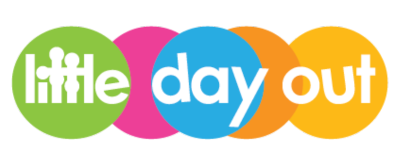







![Eurasian Heritage Gallery: History, Community And Heroes [2024] Eurasian Heritage Gallery: History, Community And Heroes](https://www.littledayout.com/wp-content/uploads/13-eurasian-heritage-centre-218x150.jpg)








